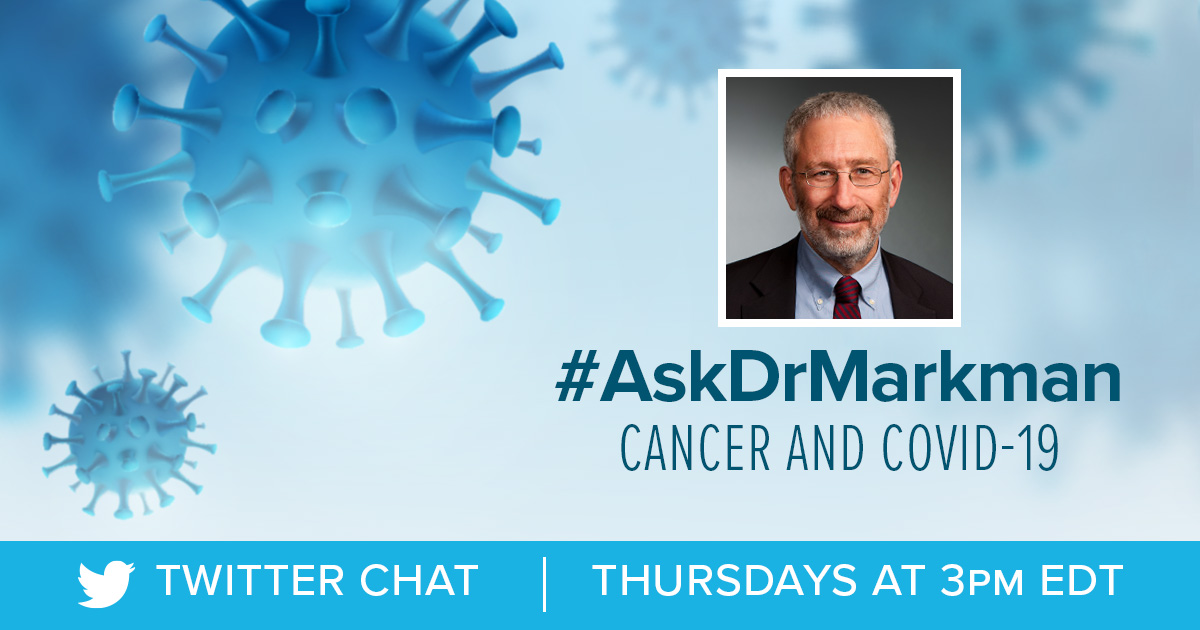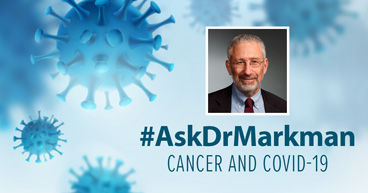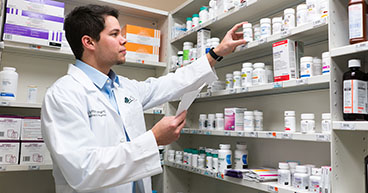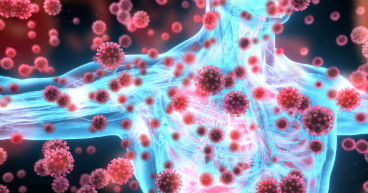
The COVID-19 pandemic has created a landscape of constantly evolving information and often confusing new developments. Cancer patients have many questions about how the virus may affect them, their access to ongoing treatments, and their overall health. Maurie Markman, MD, President of Medicine & Science at Cancer Treatment Centers of America® (CTCA), has launched a weekly Q&A hosted on Twitter to answer your questions, in real time and as questions are sent to us online and by phone. Follow us on #AskDrMarkman. Here’s this week’s chat:
Question: I’m a cancer survivor, and I saw a report that COVID-19 could be found on surfaces and in the air far longer than a few minutes. Should I be concerned?
Answer: It’s true that recent reports suggest COVID-19 can be found in aerosol particles and on solid materials for longer than a few minutes. But it’s still not known how long the virus will actually remain viable and infectious to humans in such instances. As a cancer survivor, you don’t have a higher risk of a COVID-19 infection than the average person, but everyone should follow CDC guidelines for social distancing, cloth face coverings and careful handwashing to protect against the virus’ spread.
Q: Do we know if homemade masks are actually helpful in preventing COVID-19 spread?
A: It’s difficult to definitively answer this question, but it’s highly likely that masks and other face coverings will lower the risk that someone who is unknowingly infected will inadvertently transmit the virus through sneezing or coughing. You can find a number of suggestions regarding the type of material to use in making your own face covering, but one popular idea is to make a two-layer mask, with cotton, natural silk or chiffon. The CDC offers great instructions.
Q: I’ve kept up my clinical visits with my oncologist by telemedicine, which is wonderful! Will telemedicine continue to be used after COVID-19 is under control?
A: There’s solid evidence that many, but not all, visits with an oncologist could continue to be conducted by telemedicine, which certainly has a major benefit of reducing the time and effort required by patients and their caregivers to see the doctor. But, ultimately, the decision regarding the future of this approach to medical communication will be made by federal regulators and Congress. You should certainly feel free to let your own member of Congress know your feelings regarding this important issue.
Q: I keep hearing concerns about how “sensitive” or “specific” antibody tests for COVID-19 are. What do these terms mean?
A: “Sensitivity” describes an antibody test’s ability to detect COVID-19 infections, even if the individual had few or no symptoms. The more sensitive a test, the fewer false negative results it yields. “Specificity” describes an antibody test’s ability to only detect COVID-19, and not related but irrelevant viruses. The more specific a test, the fewer number of false positive results it yields.
Q: I know that fever is a common symptom of COVID19. Do all patients have fever, and are their other less common symptoms to look out for?
A: Actually, the experience to date reveals that only about half of patients admitted to the hospital with a serious COVID-19 infection have a high fever. Therefore, while fever is common, the absence of a fever does not mean the absence of a COVID-19 infection. Several less common symptoms include sore throat, headache, loss of taste or smell and diarrhea. The CDC has updated its list of symptoms to reflect these and other signs.
Q: I saw a report that suggested getting injected with the serum of someone who had recovered from a COVID-19 infection was not helpful. Is this true?
A: A recent study involving fewer than 25 seriously ill COVID-19 patients in China found no difference in the outcome between those who received a convalescent patient’s serum and those who didn’t. The study was too small to draw meaningful conclusions. However, it’s important to note that ongoing investigations in the United States and elsewhere are continuing to study this critical question.
Q: As a man undergoing cancer treatment, I’m concerned after hearing men may have a higher mortality rate from COVID-19 than women, especially since cancer patients are more susceptible to the virus. Is this true?
A: Early reports have suggested men may have a somewhat higher risk of serious COVID-19 symptoms and death compared to women, although there’s no evidence of an increased risk of infection. The reason for this disparity is unclear, but it may have more to do with the higher incidence of pre-existing chronic medical conditions in men, such as serious smoking-related lung damage.
Q: My daughter is eight months pregnant, and I’m concerned that she’s at higher risk of COVID-19. Should I be worried?
A: There’s no current evidence that pregnancy itself is associated with a greater risk of COVID-19 infection, or that pregnant women have more serious symptoms when infected with the virus. It’s also important to note that there’s no evidence of an increased risk of COVID-19-related pregnancy complications or miscarriages.
Q: With more and more workers in meatpacking plants contracting the virus, I continue to be worried about the safety of the meat we eat. I know the experts say our food supply is safe, but what do you think? Are you still eating meat?
A: Yes, I still enjoy a good steak now and then. It’s critical to note that there’s no current evidence that COVID-19 is transmitted through food, beverages or the packaging they come in. That said, it’s always important to follow food safety practices, independent of this virus. You can find great tips and advice on the CDC website.
Learn more about food safety for cancer patients.
Q: I continue to hear about a malaria drug and antibiotic combination as a potential COVID-19 treatment. Why are experts advising against taking this medicine?
A: There’s currently no evidence that the use of hydroxycloroquine or cloroquine with azithromycin has a positive impact on the seriousness or duration of symptoms of a COVID-19 infection. But there are reports that this drug regimen may cause serious adverse cardiac events. Outside the confines of a clinical trial, there’s little if any clinical data to support using this strategy to treat COVID-19 at this time.
If you are a cancer survivor or in active treatment and are concerned about how the COVID-19 situation may impact you or your care, please contact your care team.
Learn more about changing cancer treatment schedules during the pandemic.



